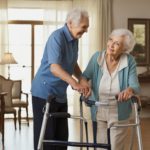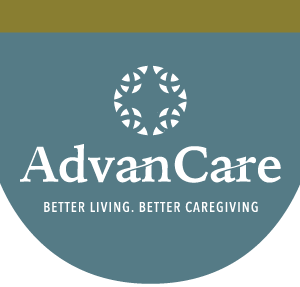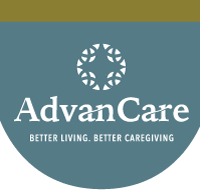
Fighting Back Against Osteoporosis in Aging: Advancare’s Strategies
January 24, 2024
Finding Friendship for Better Health: The Role of Companion Animals – Advancare’s Perspective
January 24, 2024As a senior care provider, your role is pivotal in helping older adults navigate the intricacies of aging with dignity and safety. The sanctuary of one’s home can present a surprising array of risks, especially for the elderly. Elder care services like in-home senior care are responsible for transforming these familiar spaces into secure environments. With the guidance of seasoned professionals in senior caregiving, older individuals can continue to live independently, without the worry of the hidden dangers that may lurk around the corner.
Through careful examination of living spaces and mindful adaptation, you aim to safeguard the seniors in your charge against the common, yet unforeseen hazards that can lead to injury. Whether it’s securing loose rugs to prevent slips or organizing medications to avert mishaps, your vigilant approach is essential in promoting the well-being and autonomy of the elderly. Indeed, the expertise you bring as a senior care provider is not just a service—it’s a lifeline for those valuing their independence as they age.
Key Takeaways
- Identify and remedy tripping hazards like unsecured rugs and clutter.
- Ensure bathrooms are equipped with non-slip surfaces and safety rails.
- Recognize kitchen risks and take precautions against burns and cuts.
- Assess and modify homes for better elderly mobility and access.
- Stay informed on the latest elderly assistance methods and tools.
- Proactively conduct safety checks to preempt potential accidents.
Understanding the Risks in In-Home Senior Care
When it comes to elderly assistance, being aware of the risks within the home environment is critical. As you provide senior home care, remember that adjusting the residence to suit the needs of aging individuals is key to aging in place assistance. Now, let’s delve into some of the most common risks and how to mitigate them.
Common Household Hazards
Falls are the leading cause of injury among seniors, often due to overlooked household hazards. Obstacles like loose cords, cluttered walkways, and slippery floors can pose significant risks. Unsecured rugs and mats add to potential tripping dangers, while high thresholds and unstable furniture can also contribute to falls. Furthermore, inappropriately stored medications present a dangerous threat, potentially leading to life-threatening errors in dosage or consumption.
Preventing Accidents Before They Happen
The best strategy for senior home care is to take preemptive action to avoid accidents. This involves decluttering spaces, securing loose rugs or removing them altogether, and ensuring that all pathways are clear and well-lit. Additionally, installing grab bars in strategic locations such as the bathroom and near the bed can provide stability for your senior residents. Storing medications in well-organized, labeled containers is another effective measure to prevent mishaps. Remember, taking these precautions today can prevent the accidents of tomorrow.
Importance of Regular Safety Assessments
Conducting regular safety assessments ensures a continual adaptation of living spaces to meet the evolving needs of aging individuals. These assessments allow for the identification and remediation of new risks, guarantee a safer living environment, and provide peace of mind for family members. Such checks are an essential part of the ongoing process of aging in place assistance and ensure that the homes are suited for safe, independent living.
| Hazard Category | Examples | Preventative Measures |
|---|---|---|
| Falls | Loose rugs, wet floors, obstructed pathways | Non-slip mats, clear walkways, adequate lighting |
| Furniture | Unstable shelves, high threshold | Securing furniture to walls, installing ramps |
| Medications | Misplaced pills, confusion with dosages | Organized medicine dispensers, clear labeling |
As you explore the options for senior care facilities, it’s vital to understand the challenges they face in maintaining a safe environment for residents. The issues range from infection control to ensuring adequate staffing levels for the provision of assisted living services. Let’s delve into these challenges in detail.

High hygiene standards are essential in the battle against the spread of infectious diseases. Assisted living services prioritize cleanliness and sanitary practices to protect both residents and staff from potential health threats. Additionally, adequate staff-to-resident ratios are necessary to provide personalized attention and meet the unique needs of each individual in senior care facilities.
Without personalized care plans, residents may not receive the care tailored to their specific requirements. There’s a need for customized strategies to ensure each individual’s safety and wellbeing within these communal living settings.
- Regular sanitation and infection control measures
- Strict adherence to staff-to-resident ratios
- Development and implementation of individualized care plans
Consideration of these elements is non-negotiable when striving for a secure and nurturing atmosphere for our aging population.
Solutions for Elderly Assistance and Injury Prevention
Ensuring the safety of our seniors is a cornerstone of empathetic senior caregiving. It’s critical to tailor senior care options to the needs of the elderly, focusing on creating a secure living environment and preparing caregivers to respond to emergency situations effectively. Injury prevention and senior safety must be integral components of elderly care plans.
Adapting Homes for Senior Safety
Adaptations to the home setting can play a significant role in preventing accidents and injuries among the elderly. Simple yet crucial modifications include the installation of grab bars in strategic locations like bathrooms and hallways, application of non-slip flooring to navigate spaces safely, and improvement of home lighting to prevent falls during low-light conditions. These changes not only secure the physical environment but also foster a sense of confidence and comfort for seniors.
Training for Senior Care Providers on Emergency Protocols
Investing in comprehensive training programs for senior care providers ensures that they are well-equipped to handle emergencies. This training should cover a variety of scenarios, from medical events like strokes and heart attacks to natural disasters. Emergency protocol training reinforces the provider’s ability to act swiftly and effectively, minimizing risks for seniors in critical situations.
Assistive Devices That Enhance Elderly Independence
Empowering seniors with assistive devices is essential for promoting their independence and mobility. Items such as walkers, wheelchairs, and personal alert systems are indispensable tools that aid in the day-to-day lives of the elderly. These devices not only enhance safety but also support seniors in maintaining an active and autonomous lifestyle within their own homes.
Senior Care Providers: Empowering Caregivers with Knowledge
The trajectory of senior caregiving is continuously evolving, with in-home senior care playing a pivotal role. As a caregiver, enhancing your skill set with the right knowledge and expertise is indispensable in delivering the highest standard of elder care services. Delving into educational resources elevates your competence, while being part of a robust caregiver community boosts your ability to care for the elderly with compassion and efficiency.
Educational Resources for Home Care Aides
It is vital for you, as a home care aide, to stay adept with the dynamic realms of elder caregiving. Below is a comprehensive table outlining key educational resources that can fortify your caregiving skills:
| Resource Type | Description | Benefits |
|---|---|---|
| Online Courses and Workshops | Structured programs covering various aspects of senior care, from basic assistance to specialized conditions. | Flexible learning and certification on completion. |
| Webinars and Live Events | Interactive sessions with experts in the field discussing up-to-date practices and innovations in senior care. | Engagement with thought leaders and capturing real-time insights. |
| E-books and Publications | In-depth guides and articles written by healthcare professionals and seasoned caregivers. | A wealth of knowledge that you can access and reference anytime. |
| Community Forums | Platforms for sharing experiences, seeking advice, and discussing concerns with fellow caregivers. | Real-world problem-solving and support from peers. |

Building a Supportive Community for Caregivers
Being a caregiver can be rewarding, but it’s not without its challenges. Having a solid community backup reinforces your support system and presents opportunities for growth. Why not leverage social media groups and local meet-ups to connect with other caregivers? Sharing experiences, problems, and solutions within a community propels your personal and professional development, ensuring that you continue to provide exceptional in-home senior care.
- Joining caregiver support groups
- Participating in local caregiver community events
- Attending caregiver conferences
By embracing both continuing education and community integration, you become part of an empowered force of caregivers. This collective strength is a boon not just to your career growth, but more importantly, to the seniors whose lives you touch every day.
Promoting Aging in Place Assistance with Advancare
As our loved ones age, the comfort of familiar surroundings and the desire to maintain independence become paramount. Advancare stands at the forefront, championing the cause of aging in place assistance, allowing for a more personal and dignified approach to senior caregiving. This service is a cornerstone in the realm of senior home care, providing both families and seniors the option to tailor care programs that align with their individual needs and preferences.
Emphasizing the consolidation of safety measures and personal independence, Advancare’s services are not just about assistance, they are about enriching lives. Encouraging elderly individuals to remain in their own homes can have numerous positive effects on their mental and emotional well-being—a truth recognized and respected by Advancare’s team. Their goal is to ensure those they serve can enjoy the highest quality of life in the safety and comfort of their own home.
You are not just providing care, you are nurturing an environment where seniors can thrive with dignity.
The initiatives implemented by Advancare focus on creating secure home environments where seniors can navigate daily life with ease. This includes providing support with a variety of tasks—ranging from personal care to more complex medical needs—thereby preventing the feeling of helplessness that might arise as a result of age-related restrictions.
Aging in place is not only beneficial for the senior but also cost-effective for their families. Below is a table that compares some of the costs associated with aging at home versus alternative care options:
| Service | At-Home Care Cost | Assisted Living Cost | Nursing Home Cost |
|---|---|---|---|
| Personal Care Assistance | $20 per hour | $3,750 per month | $7,500 per month |
| Household Management | $35 per hour | Included | Included |
| Nutrition Support | $10 per meal delivery | Included | Included |
| Medical Alert Systems | $50 per month | $100 per month | $200 per month |
Understanding what you need is the first step to making the right choice for your loved ones. Advancare is here to guide you through those choices, making sure the seniors under their care can enjoy their golden years from the sanctuary of their homes. When thinking about senior caregiving, consider the option of aging in place assistance, and recognize the empowering difference it can make in the life of your loved one.
Conclusion
In the vital mission of providing care for our seniors, you, the senior care providers, are the backbone of ensuring their safety and well-being. Home hazards stand as undeniable threats that can impair the quality of life for our older generations. It’s imperative that risk assessment, timely intervention, and continuous education form the crux of your approach to senior care. By thoroughly understanding and acting on the unique needs inherent to in-home senior care and senior care facilities, you scaffold an environment where elders can thrive securely and with dignity.
Embracing a variety of senior care options allows for tailored solutions that protect our elders from the vulnerabilities within their living spaces. As care providers, you’re tasked with forging a habitat that not only shields from harm but also promotes a sense of independence and autonomy. The tools at your disposal—ranging from modifications in the living environment to innovative training programs—craft a tapestry of support that endows seniors with the ease and assurance they deserve in their later years.
Your steadfast commitment and dedication in navigating and neutralizing potential dangers reflect the high esteem in which we hold our aging population. As society progresses, your role becomes increasingly crucial, crafting a legacy of comfort, security, and autonomy for those who have spent a lifetime contributing to our community. It is a sincere testament to your indispensable contributions in ensuring that every day is a step towards a safer, more nurturing horizon for our treasured elders.
FAQ
What are the top dangers for seniors within the home environment?
Senior care providers need to be aware of tripping hazards such as rugs and electrical cords, bathroom hazards like slippery surfaces, kitchen risks with sharp utensils and hot surfaces, obstructed pathways, unstable furniture, and medication mismanagement.
How can accidents be prevented in the homes of seniors?
Accidents can be prevented through proactive measures such as decluttering, securing rugs and carpets, ensuring proper storage and management of medications, and performing regular safety assessments to identify and mitigate risks.
What is the importance of regular safety assessments for the elderly?
Regular safety assessments are vital for identifying potential hazards that might have developed over time. They help adapt the home environment to minimize the risk of falls, health emergencies, and other accidents, promoting a safe living space for seniors.
What unique challenges do senior care facilities face?
Senior care facilities must contend with the spread of infectious diseases, staffing ratios, and providing individualized care plans. These challenges require targeted responses like enforcing strict hygiene protocols, maintaining adequate staff levels, and delivering personalized care.
How can homes be adapted to improve senior safety?
Adapting homes for senior safety can involve installing grab bars, non-slip flooring, and adequate lighting, among other modifications. These adaptations make the home environment safer and more accessible for aging individuals.
What emergency protocols should senior care providers be trained in?
Senior care providers should be trained in comprehensive emergency protocols that include first aid, fall prevention strategies, and how to appropriately respond to a variety of medical emergencies or natural disasters.
What types of assistive devices can help enhance elderly independence?
Assistive devices such as walkers, wheelchairs, and personal alert systems are important for promoting autonomy and safety, enabling seniors to navigate their environments more effectively and signal for help if necessary.
Why is it important for home care aides to access educational resources?
Access to educational resources ensures that home care aides stay up-to-date with the best practices in elderly care, understand the evolving needs of seniors, and are equipped with the latest knowledge to provide quality in-home care.
How does building a supportive community benefit caregivers?
Building a supportive community provides caregivers with a network to share experiences, strategies, and solutions, reducing caregiver burnout and enhancing the quality of care they provide to seniors.
How does Advancare promote aging in place for seniors?
Advancare supports aging in place by providing tailored services such as personal care, household management, and safety modifications, helping seniors to maintain their independence and quality of life in their own homes for as long as possible.





